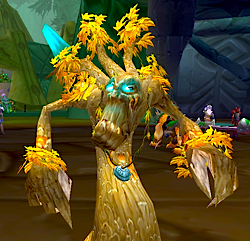British journalist-turned-blogger consulted Adam Tinworth, someone on whom I rely a lot for interesting insights into our shared interests, is at it again with his explanation of how World of Warcraft is a Social Operating System.
The basic framework is familiar enough: when you get a bunch of people talking to each other and doings together, they form real attachments regardless of whether the tasks are mediated via software and distributed across great distances or are up close and at physical hand. This is the stuff of many interesting pieces by folks like Clay Shirky and Cory Doctorow and all the Boing Boing crew, for instance.
Nonetheless, Adam brings some fresh things to the conversation, starting with his personal experience.
Not long ago, he left his longtime guild after a bout of drama, and while he was welcomed into another, it turns out that without the long-time background of familiar friends and acquaintances, he’s just less motivated to play. (I’ve had that feeling as well, and also in smaller degrees when the folks I like best are on vacation, sick, fleeing hurricanes, or what have you. He describes it well.)
In addition, he touches on two factors that I think are underestimated in almost all conversation about things like “What will be the next great big thing in MMOs?” and “What will displace Blizzard from the top of the heap?”
#1: Macintosh support. Sure, Macs are a minority choice. But there is a significant chunk of the population out there who, like Adam and me, use Macs and like social gaming. Blizzard is head and shoulders—heck, head and knees—above nearly all the competition in this regard, and it contributes to that very loyal customer base so often discussed. We favor Blizzard because Blizzard treats us as much like equals of Windows-based gamers as possible. We’ll see whether Spore picks up some comparably loyal following for doing the same thing; certainly it’s an audience most companies are passing by. And when you have a real community going, the real inability of some members to move to a new location matters. If, for instance, Lord of the Rings Online had Mac support, I’d be part of a crowd going to at least check it out.
#2. Original setting. Blizzard’s fans aren’t spending a lot of time arguing about how this element contradicts something in the 1967 series, or the 1984 novelization of the previous year’s movies. There’s no backstory except what Blizzard presents, and the environment doesn’t have to match any outside expectations. Now there’s plenty of room for argument about various versions of Blizzard’s own world (just ask any fan of the setting’s details about changes in the role of the eredar, if you’ve got a lot of free time). But even so, it gives a tighter framework to the whole thing—newcomers need to learn what’s come so far in Blizzard’s own work, and the website has a lot of that, but there’s nothing else they need to learn to enjoy the environment.
Adam mentions the role of humor in the setting, and I’d like to expand on that a bit, while I’m commenting. The Warcraft setting is rich in drama, epic adventure, high tragedy, and all…but it’s also got a lot of just plain fun touches. This makes some actual or potential players very angry, and occasionally one stomps off, refusing to go along with a grin or giggle. I’ve come to regard this as an advantage to WoW. Anyone who’s been around fannish speculation and commentary knows the person who will not let themselves have fun. (I think this is often the result of untreated depression or other physical problem, but that’s a separate article.) Any analysis of the game world as it actually is has to take into account the goofiness, and this favors (though it doesn’t mandate) a certain lightness of touch. One can—this report has—subvert some escalating arguments by shifting the topic to favorite funny bits, without losing the sense that we are talking about the details of this cool environment.
One thing that Adam doesn’t touch is the role of, well, what he’s doing himself: blogging. WoW came along at a great time to pick up support from blogging, but so did other games. WoW happens to have a fanbase including a lot of folks who genuinely like talking to each other and helping each other out. Blog Azeroth is one current pillar of this phenomenon, a set of forums for WoW bloggers to trade tips, chat, and also to settle on topics of mutual interest that they go off to blog about. Adam’s own Leafshine: Lust for Flower maintains a formidable set of links to and comments about blogs by people playing druids of various sorts, and it seems like many WoW blogs are very rich in shared links.
Much of this happened without anyone planning it. It will be interesting to see if publishers recognize the strengths here and tries designing in some support for it next time around.
[Screenshot taken by Adam Tinworth, used with permission.]










